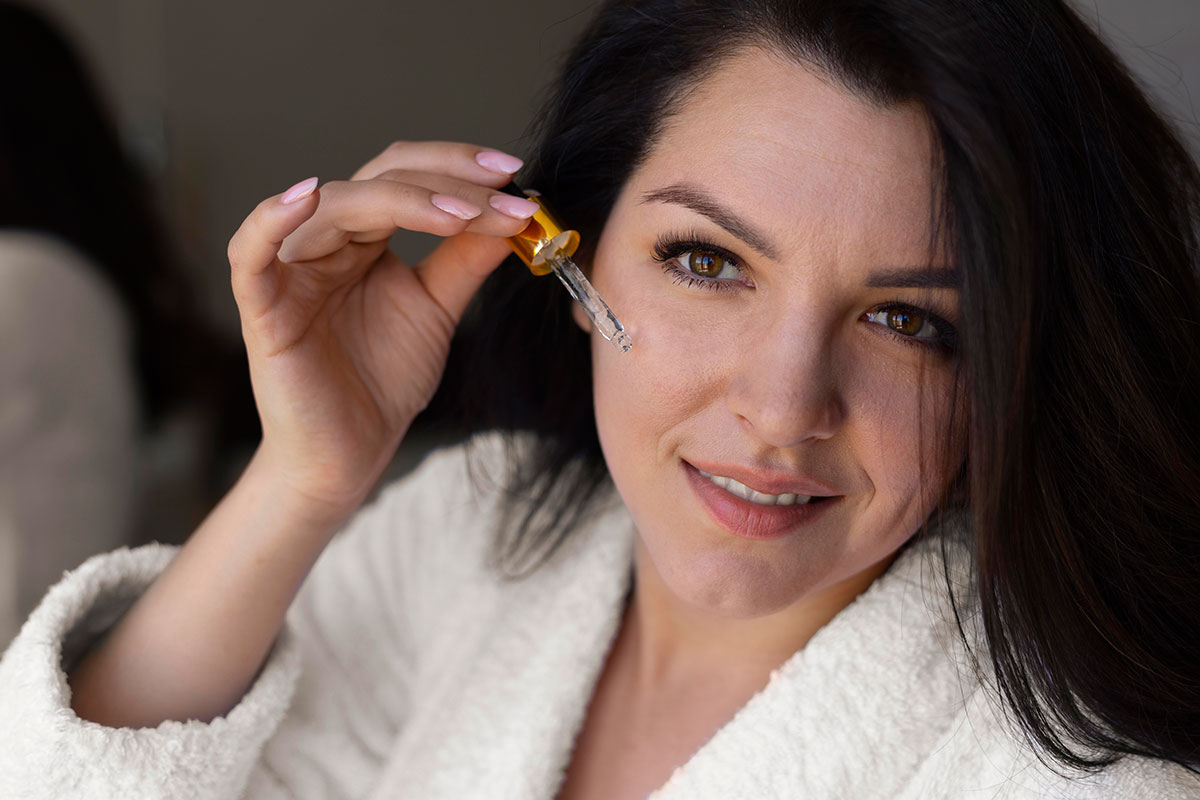Meet the rising star ingredient of the skincare industry that promises the youthfulness and radiance that everyone is striving for – Peptides. We’ve been flooded with buzz ingredients like Vitamin C, Retinol, and Hyaluronic Acid in the past as the gold standard for anti-aging.
Well, this time, the limelight belongs to the Peptides which has been outshone by its counter-buzz ingredients for far too long. It’s time to learn to include peptides in your skincare routine for the ultimate anti-aging skincare.
What are Peptides?
Peptides are essentially made up of short chains of building blocks known as amino acids that are held together by a peptide bond. They are essential fragmented protein molecules needed to maintain the structural and functional components of your skin such as elastin fibers and collagen, that help keep your skin firm and youthful in appearance.
How does Peptide work?
Proteins such as collagen are large molecular weight molecules that are only able to sit on the surface of the skin. However, with peptides, the molecular weight and size allow them to penetrate the outer layer of the skin, thus sinking in more deeply into the layers of the skin. Imagine peptides as little messengers that trigger skin cells to perform certain functions for a particular benefit such as boosting collagen and elastin production for firmer skin and smoothing out wrinkles.
All Peptides are not created equal:
There are five different types of peptides related to skincare, each having a different function to help protect and restore the skin’s natural elasticity and firmness.
1. Signaling Peptides: Palmitoyl Pentapeptides
These peptides function to stimulate collagen, elastin, hyaluronic acid, and epidermal growth factor (EGF) synthesis to reduce the formation of wrinkles and fine lines.
2. Signaling Peptides: Palmitoyl Pentapeptides Enzyme-inhibitor Peptides: Trifluoroacetyl Tripeptide-2, TrylagenSignaling Peptides: Palmitoyl Pentapeptides
These peptides function to act directly on enzymes such as Tyrosinase which is responsible for initiating the production of skin pigmentation in the skin. The result, is a reduction in melanin production by the skin and a general lightening of the skin tone.
3. Carrier Peptides: Copper Peptides
These peptides work by transporting trace elements such as Copper and Manganese to facilitate wound healing. This is also the most researched peptide.
4. Antimicrobial Peptides: Defensins, Cathelicidins
This group of peptides can be produced by the body itself. They have broad antibacterial functions and are part of the primary mechanism used by the skin in the immune defense.
5. Neurotransmitter-inhibiting Peptides: Argireline
This group of peptides focuses on blocking the signal transmission between nerves and muscle to prevent muscle contraction of expression lines. This is commonly found in Botox injections.
Benefits of Peptides for the Skin
1. Stimulate collagen production in the skin
Collagen is a protein that is naturally produced by our bodies to maintain healthy joints and skin elasticity. Three-quarters of this compound is found in the skin! However, as we age, the ability of the body to produce more collagen becomes much slower than the rate of the breakdown of collagen production. This is why our skin becomes thinner, drier, and less elastic as we age. When peptide is applied to the skin, the short fragments of peptides are able to penetrate deeper into the skin to send signals to the body to increase collagen production which results in healthier, plumper-looking skin.
2. Strengthen the skin barrier
A strong and healthy skin barrier ensures that moisture stays within the skin while keeping the bad stuff such as bacteria and pollutants out. When the skin barrier is compromised, skin issues such as acne, eczema, and rosacea can occur, leading to flaky, weak, and cracked skin, plus irritation Unlike larger molecules that sit on the surface of the skin, peptides are able to penetrate deeper into the layers of the skin, creating a firmer matrix and strengthening the skin barrier.
3. Has anti-inflammatory properties
There are certain peptides that contain amino acids Alanine and Tyrosine with high antioxidant properties that can help soothe and calm the skin, leading to less inflammation.
4. Helps reduce the formation of wrinkles
Research has shown that when the collagen-like peptide is applied to the skin for over 4 weeks, the results showed a significant reduction in the total surface wrinkles, as well as, the depth and length of the wrinkles. Some peptides with neurotransmitter-inhibiting abilities are able to relax the muscle on underlying facial muscles to prevent the formation of wrinkles, making this ingredient a potential key player in anti-aging skincare routines.
5. Repair damaged skin
Several research studies have shown that synthetic peptides when applied topically have improved clinical outcomes in aged skin and wound-healing processes. The results have shown a reduction in skin roughness, improved elasticity, and increased suppleness.
How to use Peptides
While peptides can be found as an ingredient in many types of skincare products from cleansers to serums to moisturizers, it is important to understand that the frequency and effectiveness depend on the type of products you choose that best suits your skin type. Peptides found in cleansers will not benefit your skin as compared to serums and moisturizers. This is because the length of time that the cleanser stays on your face is so short that there is insufficient time for the peptide to penetrate the skin and do its job before the cleanser is washed off from your skin. Therefore, using peptides in the form of serum or moisturizer would be much more effective.
Peptide is a great ingredient that works well with antioxidants (i.e., Vitamin C, Niacinamide, retinol) and hydrating ingredients such as Hyaluronic Acid. Depending on how sensitive your skin is, and the concentration of the ingredients that you are using, it is best to use the combination of products in separate routines to start and slowly pair them together in the same routine.
However, there are a few cautions. Firstly, Copper peptides should be used in a different routine from Vitamin C because copper, when mixed with Vitamin C can oxidize the Ascorbic Acid in Vitamin C, making it ineffective.
Secondly, avoid using peptides in the same routine as Alpha Hydroxy Acids (AHAs) and Beta Hydroxy Acids (BHAs) as acids have the ability to break down proteins, and peptides being the precursors to protein can be rendered ineffective in the presence of acids.
Lastly, avoid using Copper peptides (specifically) and retinol together in a routine as Copper peptides increase blood flow to the skin which exacerbates the skin sensitivity that is often a side effect of the use of retinol.

